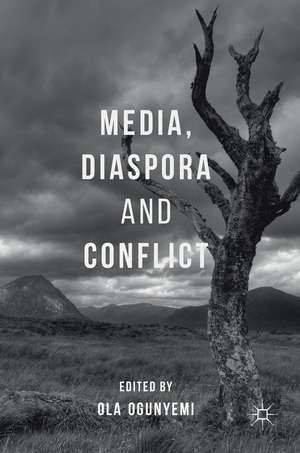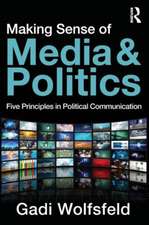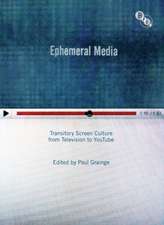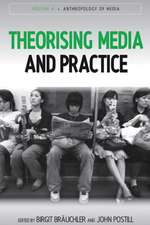Media, Diaspora and Conflict
Editat de Ola Ogunyemien Limba Engleză Hardback – 19 sep 2017
| Toate formatele și edițiile | Preț | Express |
|---|---|---|
| Paperback (1) | 466.90 lei 39-44 zile | |
| Springer International Publishing – 10 aug 2018 | 466.90 lei 39-44 zile | |
| Hardback (1) | 698.62 lei 6-8 săpt. | |
| Springer International Publishing – 19 sep 2017 | 698.62 lei 6-8 săpt. |
Preț: 698.62 lei
Preț vechi: 821.91 lei
-15% Nou
Puncte Express: 1048
Preț estimativ în valută:
133.71€ • 139.07$ • 112.05£
133.71€ • 139.07$ • 112.05£
Carte tipărită la comandă
Livrare economică 13-27 martie
Preluare comenzi: 021 569.72.76
Specificații
ISBN-13: 9783319566412
ISBN-10: 3319566415
Pagini: 240
Ilustrații: XXIII, 240 p.
Dimensiuni: 148 x 210 x 21 mm
Greutate: 0.47 kg
Ediția:1st ed. 2017
Editura: Springer International Publishing
Colecția Palgrave Macmillan
Locul publicării:Cham, Switzerland
ISBN-10: 3319566415
Pagini: 240
Ilustrații: XXIII, 240 p.
Dimensiuni: 148 x 210 x 21 mm
Greutate: 0.47 kg
Ediția:1st ed. 2017
Editura: Springer International Publishing
Colecția Palgrave Macmillan
Locul publicării:Cham, Switzerland
Cuprins
1. Introduction: Communicating Conflict from the Diaspora, Olatunji Ogunyemi.- 2. Diaspora Journalism and Conflicts in Transnational Media Circuits, Ayo Oyeleye.- 3. The diasporic community’s intervention in the Libya uprising, Everett Ndlovu.- 4. Diaspora media role in conflict and peace building from the perspectives of Somali diaspora in Canada, Brian Chama.- 5. An exploration of Discourses of Peace and Conflict during Negotiations for Zimbabwe’s Government of National Unity in the Diaspora Media, Tendai Chari.- 6. Diasporic online radio and the mediation of Zimbabwean conflict/crisis, Bhekinkosi Jakobe Ncube.- 7.Connected to Conflict; the precariousness of working in the Somali media, Idil Osman.- 8. Dynamics of the diasporic Syrian media in Egypt: The context and perspectives, Alamira Samah F. Saleh.- 9. Representing Conflict: Gatekeeping Practices and Framing Devices of African Diasporic Press, Olatunji Ogunyemi.- 10. Representation of Darfur Conflict in Diasporic Media, Rokeshia Renné Ashley.- 11. The media use of diaspora in a conflict situation – A case study of Venezuelans in Finland, Virpi Salojärvi.- 12. A Comparative Analysis of the Representation of Syrian Refugees in Turkish and Diasporic Media: The Case of “etilaf.org”, Burcu KAYA ERDEM and Uğur Gündüz.- 13. Diasporic new media and conversations on conflict: A case of Zimbabwe genocide debates, Shepherd Mpofu.- 14. Online Communities, Conflict, and Diaspora: The Case of South Sudanese Women, Maha Bashir.
Notă biografică
Olatunji Ogunyemi is Principal Lecturer in journalism at the University of Lincoln, UK, and has extensive teaching and research experience in both the United Kingdom and overseas. He regularly publishes articles in journals and chapters in edited books and is the author of What Newspapers, Films, and Television do Africans Living in Britain See and Read? The Media of the African Diaspora.
Textul de pe ultima copertă
This edited collection argues that the connective and orientation roles ascribed to diasporic media overlook the wider roles they perform in reporting intractable conflicts in the Homeland. Considering the impacts of conflict on migration in the past decades, it is important to understand the capacity of diasporic media to escalate or deescalate conflicts and to serve as a source of information for their audiences in a competitive and fragmented media landscape. Using an interdisciplinary perspective, the chapters examine how the diasporic media projects the constructive and destructive outcomes of conflicts to their particularistic audiences within the global public sphere. The result is a volume that makes an important contribution to scholarship by offering critical engagements and analyzing how the diasporic media communicates information and facilitates dialogue between conflicting parties, while adding to new avenues of empirical case studies and theory development in comprehending the media coverage of conflict.
Caracteristici
Fills a gap in literature on our understanding of diasporic media which has predominantly focused on their connective and orientation roles Includes the roles of diasporic media in highlighting invisible conflicts and in promoting their constructive and destructive outcomes Bridges the hiatus in literature by providing a deeper insight into the roles the diasporic media play in covering ‘invisible conflicts’ and in promoting their constructive and destructive outcomes Includes supplementary material: sn.pub/extras
















